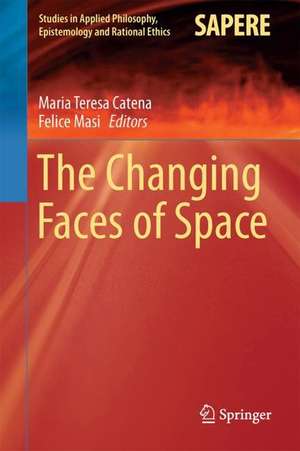The Changing Faces of Space: Studies in Applied Philosophy, Epistemology and Rational Ethics, cartea 39
Editat de Maria Teresa Catena, Felice Masien Limba Engleză Hardback – 29 ian 2018
| Toate formatele și edițiile | Preț | Express |
|---|---|---|
| Paperback (1) | 642.68 lei 6-8 săpt. | |
| Springer International Publishing – 6 iun 2019 | 642.68 lei 6-8 săpt. | |
| Hardback (1) | 649.06 lei 6-8 săpt. | |
| Springer International Publishing – 29 ian 2018 | 649.06 lei 6-8 săpt. |
Din seria Studies in Applied Philosophy, Epistemology and Rational Ethics
- 20%
 Preț: 603.89 lei
Preț: 603.89 lei -
 Preț: 397.59 lei
Preț: 397.59 lei -
 Preț: 359.53 lei
Preț: 359.53 lei - 20%
 Preț: 989.96 lei
Preț: 989.96 lei - 24%
 Preț: 787.48 lei
Preț: 787.48 lei -
 Preț: 390.08 lei
Preț: 390.08 lei -
 Preț: 370.88 lei
Preț: 370.88 lei - 15%
 Preț: 641.20 lei
Preț: 641.20 lei - 20%
 Preț: 991.60 lei
Preț: 991.60 lei - 20%
 Preț: 646.95 lei
Preț: 646.95 lei - 15%
 Preț: 653.98 lei
Preț: 653.98 lei -
 Preț: 384.48 lei
Preț: 384.48 lei -
 Preț: 395.47 lei
Preț: 395.47 lei - 18%
 Preț: 1216.95 lei
Preț: 1216.95 lei - 18%
 Preț: 947.50 lei
Preț: 947.50 lei -
 Preț: 388.72 lei
Preț: 388.72 lei -
 Preț: 390.08 lei
Preț: 390.08 lei -
 Preț: 395.09 lei
Preț: 395.09 lei -
 Preț: 394.12 lei
Preț: 394.12 lei - 15%
 Preț: 644.82 lei
Preț: 644.82 lei - 15%
 Preț: 698.15 lei
Preț: 698.15 lei - 18%
 Preț: 1840.91 lei
Preț: 1840.91 lei - 20%
 Preț: 656.84 lei
Preț: 656.84 lei -
 Preț: 389.70 lei
Preț: 389.70 lei - 20%
 Preț: 991.46 lei
Preț: 991.46 lei - 15%
 Preț: 585.73 lei
Preț: 585.73 lei - 15%
 Preț: 711.40 lei
Preț: 711.40 lei - 15%
 Preț: 589.33 lei
Preț: 589.33 lei - 15%
 Preț: 700.42 lei
Preț: 700.42 lei
Preț: 649.06 lei
Preț vechi: 763.60 lei
-15% Nou
Puncte Express: 974
Preț estimativ în valută:
124.21€ • 128.32$ • 103.38£
124.21€ • 128.32$ • 103.38£
Carte tipărită la comandă
Livrare economică 26 martie-09 aprilie
Preluare comenzi: 021 569.72.76
Specificații
ISBN-13: 9783319669106
ISBN-10: 3319669109
Pagini: 334
Ilustrații: XIII, 327 p.
Dimensiuni: 155 x 235 mm
Greutate: 0.66 kg
Ediția:1st ed. 2017
Editura: Springer International Publishing
Colecția Springer
Seria Studies in Applied Philosophy, Epistemology and Rational Ethics
Locul publicării:Cham, Switzerland
ISBN-10: 3319669109
Pagini: 334
Ilustrații: XIII, 327 p.
Dimensiuni: 155 x 235 mm
Greutate: 0.66 kg
Ediția:1st ed. 2017
Editura: Springer International Publishing
Colecția Springer
Seria Studies in Applied Philosophy, Epistemology and Rational Ethics
Locul publicării:Cham, Switzerland
Cuprins
The Space of the Living Beings: Umwelt and Space in Jakob von Uexküll.- Technology and Oikologia: Ethics and Ontology.- The Emergence of Thymic Space in L. Binswanger.- The Emergence of Thymic Space in L. Binswanger.- Geometric and Intuitive Space in Husserl.- Geometric and Intuitive Space in Husserl.- First Notes on Cosmological Aesthetics.- First Notes on Cosmological Aesthetics.- Invert it if you want to understand it. Left and Right in the Mythic and Aesthetic Space.- The City to Come. Lines of Flight from Deleuze to Koolhaas Commentary.
Textul de pe ultima copertă
This book focuses on various concepts of space and their historical evolution. In particular, it examines the variations that have modified the notions of place, orientation, distance, vacuum, limit, bound and boundary, form and figure, continuity and contingence, in order to show how spatial characteristics are decisive in a range of contexts: in the determination and comprehension of exteriority; in individuation and identification; in defining the meaning of nature and of the natural sciences; in aesthetical formations and representations; in determining the relationship between experience, behavior and environment; and in the construction of mental and social subjectivity. Accordingly, the book offers a comprehensive review of concepts of space as formulated by Kant, Husserl, Heidegger, Einstein, Heisenberg, Penrose and Thorne, subsequently comparing them to notions developed more recently, in the current age, which Foucault dubbed the age of space. The book is divided into four distinct yet deeply interconnected parts, which explore the space of life, the space of experience, the space of science and the space of the arts.
Caracteristici
Offers a comprehensive report on the concept and role of space Describes historical changes that have modified the notions of space Discusses the relationship between geometry and experience, anthropology, biology, psychology and space Discusses the relationship between spatial concepts and natural sciences Discusses the relationship between arts and representations of space
